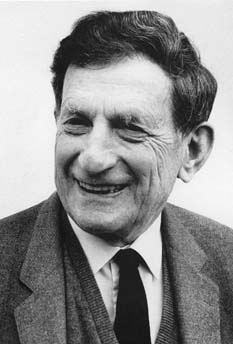|
Excerpts
from Krishnamurti's Notebook
Excerpts from Krishnamurti To
Himself
|
|
Krishnamurti Foundation
The "official"
Krishnamurti site
Rajghat School
Krishnamurti school in
India
Hear His Voice
An Interview with Krishnamurti - MP3
Audio link
|
The Core of Krishnamurti's Teachings
The following statement was written by Krishnamurti himself on
October 21, 1980 in which he summarises the teachings. It may
be copied and used provided this is done in its entirety. No editing
or change of any kind is permitted. No extracts may be used.
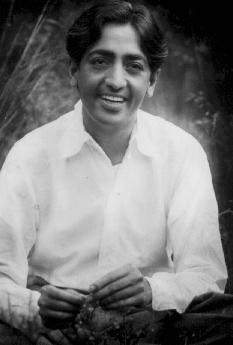 The core of Krishnamurti's teaching is contained in the statement he made in 1929 when he said:
"Truth is a pathless land." Man cannot come to it through any organization, through any creed,
through any dogma, priest or ritual, not through any philosophic knowledge or psychological
technique. He has to find it through the mirror of relationship, through the understanding of the
contents of his own mind, through observation and not through intellectual analysis or introspective
dissection. Man has built in himself images as a fence of security -- religious, political, personal.
These manifest as symbols, ideas, beliefs. The burden of these images dominates man's thinking,
his relationships and his daily life. These images are the causes of our problems for they
divide man from man. His perception of life is shaped by the concepts already established in his mind. The
content of his consciousness is his entire existence. This content is common to all humanity. The
individuality is the name, the form and superficial culture he acquires from tradition and
environment. The uniqueness of man does not lie in the superficial but in complete freedom from
the content of his consciousness, which is common to all mankind. So he is not an individual. The core of Krishnamurti's teaching is contained in the statement he made in 1929 when he said:
"Truth is a pathless land." Man cannot come to it through any organization, through any creed,
through any dogma, priest or ritual, not through any philosophic knowledge or psychological
technique. He has to find it through the mirror of relationship, through the understanding of the
contents of his own mind, through observation and not through intellectual analysis or introspective
dissection. Man has built in himself images as a fence of security -- religious, political, personal.
These manifest as symbols, ideas, beliefs. The burden of these images dominates man's thinking,
his relationships and his daily life. These images are the causes of our problems for they
divide man from man. His perception of life is shaped by the concepts already established in his mind. The
content of his consciousness is his entire existence. This content is common to all humanity. The
individuality is the name, the form and superficial culture he acquires from tradition and
environment. The uniqueness of man does not lie in the superficial but in complete freedom from
the content of his consciousness, which is common to all mankind. So he is not an individual.
Freedom is not a reaction; freedom is not choice. It is man's pretence that because he has choice,
he is free. Freedom is pure observation without direction, without fear of punishment and reward.
Freedom is without motive; freedom is not at the end of the evolution of man but lies in the first
step of his existence. In observation one begins to discover the lack of freedom.
Freedom is found in the choiceless awareness of our daily existence and activity.
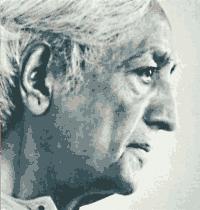 Thought is time. Thought is born of experience and knowledge which are inseparable from time
and the past. Time is the psychological enemy of man. Our action is based on knowledge and
therefore time, so man is always a slave to the past. Thought is ever-limited and so we live in
constant conflict and struggle. There is no psychological evolution. When man becomes aware of
the movement of his own thoughts he will see the division between the thinker and the thought,
the observer and the observed, the experiencer and the experience. He will discover that this division
is an illusion. Then only is there pure observation which is insight without any shadow of the past or
of time. This timeless insight brings about a deep radical mutation in the mind.
Thought is time. Thought is born of experience and knowledge which are inseparable from time
and the past. Time is the psychological enemy of man. Our action is based on knowledge and
therefore time, so man is always a slave to the past. Thought is ever-limited and so we live in
constant conflict and struggle. There is no psychological evolution. When man becomes aware of
the movement of his own thoughts he will see the division between the thinker and the thought,
the observer and the observed, the experiencer and the experience. He will discover that this division
is an illusion. Then only is there pure observation which is insight without any shadow of the past or
of time. This timeless insight brings about a deep radical mutation in the mind.
Total negation is the essence of the positive. When there is negation of all those things that thought
has brought about psychologically, only then is there love, which is compassion and intelligence.
from: http://www.cris.com/~gilesgal/2kriscor.html
|
|
Krishnamurti
Dissolves the Order of the Star
Speech made in 1929 in Ommen, Netherlands
|
|
"What is important is not controlling thought, but understanding it, understanding the origin, the
beginning of thought, which is in yourself." J. Krishnamurti |
|
Kinfonet
Many links, quotes, information, audio/video
clips |
|
Pathless
Land
Statement and Krishnamurti links
|
On Dying Daily
Ojai, August 27, 1949
|
Love and Death
"I wonder if you have ever known what love
is? Because I think death and love walk together. Death, love, and
life are one and the same. But we have divided life, as we have
divided the earth. We talk of love as being either carnal or
spiritual and have set a battle going between the sacred and the
profane. We have divided what love is from what love should be, so
we never know what love is. Love, surely, is a total feeling that
is not senti- mental and in which there is no sense of separation.
It is complete purity of feeling without the separative,
fragmenting quality of the intellect. Love has no sense of
continuity. Where there is a sense of continuity, love is already
dead, and it smells of yesterday, with all its ugly memories,
quarrels, brutalities. To love, one must die."
On
Living and Dying, Copyright 1992 by KFT and KFA
|
Brockwood
Talks - 1985
|
|
The pathless journey
of Jiddu Krishnamurti
by Bette Stockbauer
An interesting
essay on Krishnamurti found at the Share Internation site which deals
with the coming appearance of "Maitreya." The theosophists originally
believed that K. was the incarnation of this entity but had to revise
this idea when Krishnamurti renounced the whole thing and chose to stand
alone.
Also: another
article by Bette Stockbauer from the same source:
The teachings of Maitreya and Krishnamurti -- a comparison
by Bette Stockbauer
An esoteric comparison of ideas and
teachings on silence, inner space, self-awareness, honesty, sincerity
and detachment.
|
|
Observing
Without the "Me"
A talk by Krishnamurti at Brockwood Park
|
|
Conversations
with Krishnamurti
Argentine physician Ruben Feldman-Gonzalez recalls his dialogues with
Krishnamurti.
|
|
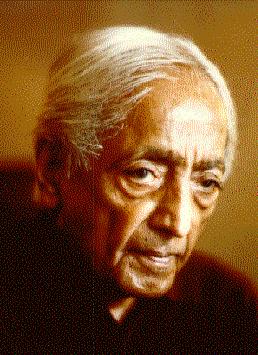
|
Krishnamurti
and David Bohm
Some quotes and further links
Krishnamurti
information
Information on
and quotes from J. Krishnamurti
including a dialogue
Deeshan
Some quotes from
Krishnamurti |
|
Excerpts
from Krishnamurti texts
Excellent page of quotes
Bernie's
Krishnamurti Page
Fine site with many excerpts from Krishnamurti's earlier days
|
On Krishnamurti
'What distinguishes Krishnamurti, even from the great teachers of
the past, the masters and the exemplars, is his absolute
nakedness. ... If he had a mission, it is to strip men of their
illusions and delusions, to knock away the false supports of
ideals, beliefs, fetishes, every kind of crutch, and thus render
back to man the full majesty, the full potency of his humanity. He
has often been referred to as "The World Teacher." If
any man living merits the title, he does.'
Henry Miller, The Books in My
Life
"When he entered my room I said to myself, 'Surely
the Lord of Love has come'. . . "
Kahlil Gibran
". . . the most impressive thing I have
listened to. It was like listening to a discourse of the Buddha -
such power, such intrinsic authority. . . "
Aldous Huxley
"a religious figure of the greatest
distinction" and added, 'He is the most beautiful being I have
ever seen."
George Bernard Shaw
"It was overpowering to listen to him. He
emanated so much energy that I felt I simply could not sit directly
across from him. He spoke simply and clearly, with very few gestures
and no rhetoric. "
Friedrich Grohe |
"The moment you have in your heart this extraordinary
thing called love and feel the depth, the delight, the ecstasy of it, you will
discover that for you the world is transformed." J. Krishnamurti
Some
Krishnamurti Books
At Kalpataru Books
Many Krishnamurti Books
Online |
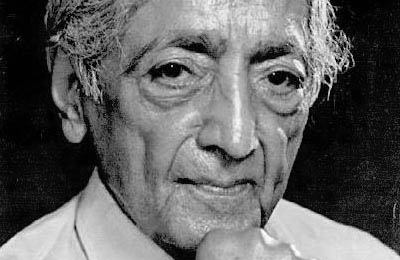
 The core of Krishnamurti's teaching is contained in the statement he made in 1929 when he said:
"Truth is a pathless land." Man cannot come to it through any organization, through any creed,
through any dogma, priest or ritual, not through any philosophic knowledge or psychological
technique. He has to find it through the mirror of relationship, through the understanding of the
contents of his own mind, through observation and not through intellectual analysis or introspective
dissection. Man has built in himself images as a fence of security -- religious, political, personal.
These manifest as symbols, ideas, beliefs. The burden of these images dominates man's thinking,
his relationships and his daily life. These images are the causes of our problems for they
divide man from man. His perception of life is shaped by the concepts already established in his mind. The
content of his consciousness is his entire existence. This content is common to all humanity. The
individuality is the name, the form and superficial culture he acquires from tradition and
environment. The uniqueness of man does not lie in the superficial but in complete freedom from
the content of his consciousness, which is common to all mankind. So he is not an individual.
The core of Krishnamurti's teaching is contained in the statement he made in 1929 when he said:
"Truth is a pathless land." Man cannot come to it through any organization, through any creed,
through any dogma, priest or ritual, not through any philosophic knowledge or psychological
technique. He has to find it through the mirror of relationship, through the understanding of the
contents of his own mind, through observation and not through intellectual analysis or introspective
dissection. Man has built in himself images as a fence of security -- religious, political, personal.
These manifest as symbols, ideas, beliefs. The burden of these images dominates man's thinking,
his relationships and his daily life. These images are the causes of our problems for they
divide man from man. His perception of life is shaped by the concepts already established in his mind. The
content of his consciousness is his entire existence. This content is common to all humanity. The
individuality is the name, the form and superficial culture he acquires from tradition and
environment. The uniqueness of man does not lie in the superficial but in complete freedom from
the content of his consciousness, which is common to all mankind. So he is not an individual.  Thought is time. Thought is born of experience and knowledge which are inseparable from time
and the past. Time is the psychological enemy of man. Our action is based on knowledge and
therefore time, so man is always a slave to the past. Thought is ever-limited and so we live in
constant conflict and struggle. There is no psychological evolution. When man becomes aware of
the movement of his own thoughts he will see the division between the thinker and the thought,
the observer and the observed, the experiencer and the experience. He will discover that this division
is an illusion. Then only is there pure observation which is insight without any shadow of the past or
of time. This timeless insight brings about a deep radical mutation in the mind.
Thought is time. Thought is born of experience and knowledge which are inseparable from time
and the past. Time is the psychological enemy of man. Our action is based on knowledge and
therefore time, so man is always a slave to the past. Thought is ever-limited and so we live in
constant conflict and struggle. There is no psychological evolution. When man becomes aware of
the movement of his own thoughts he will see the division between the thinker and the thought,
the observer and the observed, the experiencer and the experience. He will discover that this division
is an illusion. Then only is there pure observation which is insight without any shadow of the past or
of time. This timeless insight brings about a deep radical mutation in the mind. 
